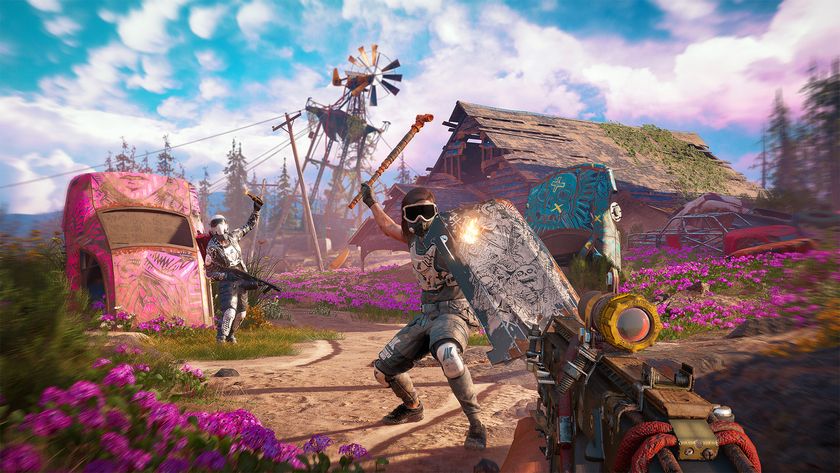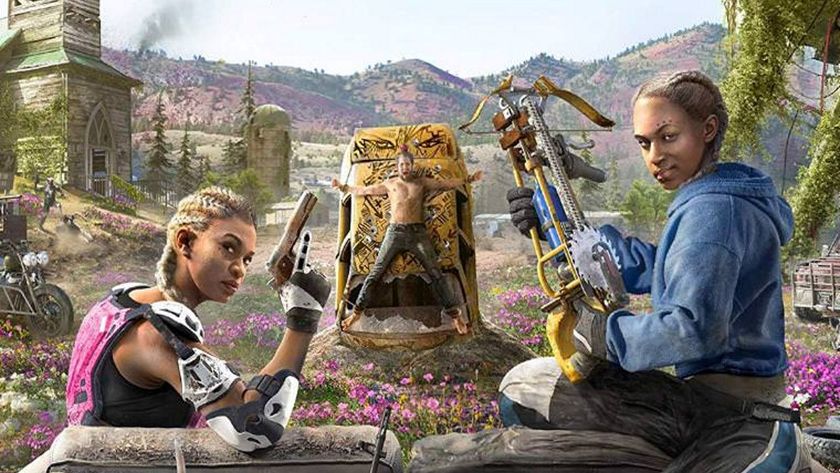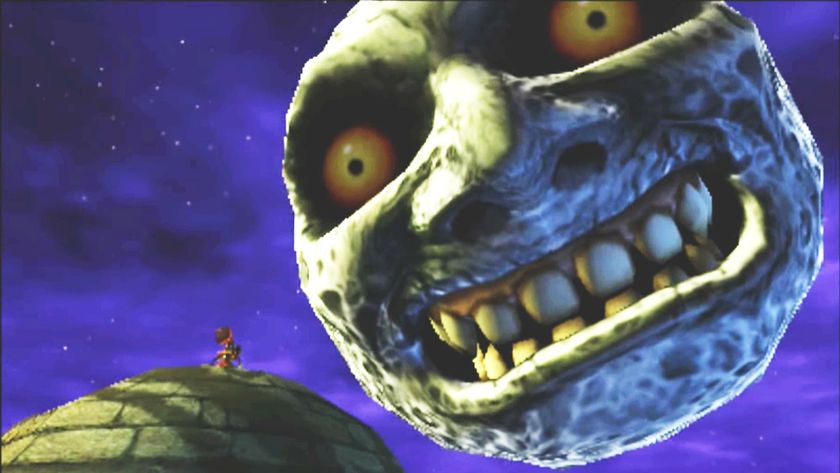Far Cry 5 seems to be tangling with bold, contemporary issues, but I’m not sure how seriously it takes them
Far Cry is travelling into the troubled heart of modern America but it's too early to tell if developer Ubisoft is committed to the journey

You might remember that over recent weeks, talk of Ubisoft scouting the US for countryside locations had led many to assume a Wild West reimagining of the next Far Cry. That was a sensible deduction, given the suitability of the open-world shooter’s gameplay conceits for a chaotic, cowboy wilderness simulator, and of course, the ever-virile popularity of Red Dead Redemption. Not to mention the conceptual precedent set by Far Cry Primal leaping back to the prehistoric era last year.
But now we know the truth. That rumour? Right location, wrong era. Far Cry 5 is set in modern-day Montana, a vast, sweeping, picturesque landscape presenting perfect fuel for Far Cry’s predilection for combining stunning natural beauty with sprawling, explorative freedom. And it is indeed beautiful. What I’ve seen of Far Cry 5’s in-game landscapes has been downright tantalising, all shimmering, endless blue skies, crystal rivers, and oceans of rolling farmland sweeping out as far as the eye can see. It’s a glorious, verdant setting, with a tone distinct from any of the series’ previous, traditionally more tropical locales, packing a strange, fresh blend of the extra-familiar and the slightly alien. I’m dying to jump into a buggy and hurtle off through the crop fields for an explore.
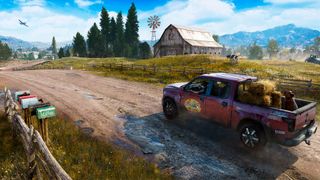
But it’s not just in the physical make-up of its setting that Far Cry 5 hits a clash between the everyday and the unusual. While the more familiar, closer-to-home location, transposed into a harsh, murderous wilderness, is undoubtedly a potent and exciting scenario – possibly the most promising the series has seen in a while in terms of a meaningful shake-up, and yes, I’m counting tiger-riding cavemen in that equation – it’s the fiction at play in Far Cry 5’s narrative set-up (or rather the lack of fiction), that presents the real eyebrow-raiser.
Meet Far Cry's 5 antagonists: a thoroughly modern militia
Far Cry 5’s antagonist faction is not - as related to me at length, in deadly serious, sombre tones by series executive producer Dan Hay - the standard-issue bunch of unhinged, video game terrorists, or the oppressive army of an extravagant, comic-book dictator. They’re very real, very well researched, and they exist in the US in notable numbers, right now, says Hay.. What we’re dealing with in Far Cry 5 is a very large, and very well organised, militia of ultra-libertarian, right-wing survivalists.
If you’re not familiar with the concept, then the blunt distillation, as Hay surmises, is ‘faith, freedom, and firearms’. Going past the basic, top-line clichés, these groups (often also termed ‘Preppers’) value personal freedom above all else, are deeply mistrusting of intervention by the traditional governmental machine, and tend to oppose gun control and welfare systems as a matter of course. Hardline, well-armed individualists, traditionally associated with long-term preparation (hence ‘Preppers’) for what they see as the inevitable fall of current American society.

According to Hay, these are smart, well-organised groups with well-honed bullshit detectors, capable of looking after themselves for a good, long time should civilisation collapse. And in a few cases, perhaps even a tad eager to get started.
In Far Cry 5, you play a cop, alone behind the boundary of militia-controlled territory (which in this case takes in many square miles of countryside, and plenty of towns and settlements), cut off from help from the system, trying to build a resistance, and fighting to survive long enough to call for outside help. A sort of inversion of Far Cry 2’s riff on Heart of Darkness, then, the strange land this time being their homeland under unfamiliar control, and the stranger exploring it undertaking a journey not into its centre, but back out into the light.
Sign up to the 12DOVE Newsletter
Weekly digests, tales from the communities you love, and more
Overall, it sounds like a much more sober, grounded Far Cry. A more thoughtful, less cartoonish sequel. One that recognises that moving the series away from the abstraction of made-up foreign climes and onto the home turf of its majority audience is a very big deal, and that it needs to make that move count. That it needs to make it matter, by saying something. All signs initially point that way, as Hay recounts his own history of political paranoia, growing up in the ‘80s under the shadow of the Cold War, with a sense that the bottom could drop out of the accepted world order at any moment.
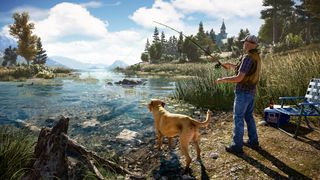
Then came the more comfortable period, when all of that went away – or, at least, drifted from mainstream consciousness – and things chilled out, and everything became sensible again. But after that came 9/11, and the steady rise of isolationism, and a growing divide in western society, and more vocal mistrust of the mainstream political system. Which led to the current, tumultuous climate, which has apparently given Hay that ‘80s feeling again, where he’s not sure whose hands are on the wheel any more. And so, Far Cry 5. It makes total sense. Of course Ubisoft would bring the series to modern-day America now, during its most ‘interesting’ political period in decades. Of course it’s choosing to explore a real-life group who, in many ways, represent an extreme microcosm of where the country is at right now.
And while, as I say, my eyebrow is immediately raised, my response is not to the choice itself, but rather the question of how it will be handled. Because of course games have the right to tackle any tricky, socio-political subject matter they like. And contrary to many a knee-jerk reaction, action games can be just as well-equipped to do that as any. Look at last year’s Mafia 3. For all of its structural issues, that game does a hell of a good job relating a brutally affecting - and relentlessly uncompromising - depiction of race in the ‘60s South. It’s well-written, brilliantly performed, and does some very smart things in terms of using its open-world game systems to compound the issues of inequality at play.
And I’m glad that Ubisoft doesn’t initially look to be taking the easy way out. There are obviously a great deal of complex, troubling, and distinctly contemporary issues at play in the subject matter the company has chosen, which demand a smart, thoughtful treatment. Why should games get the cheap luxury of using foreigners as broad-strokes bad guys, while never having to face up to the nuance of home-grown problems? Hell, that frequent propensity to use the quick-fix, generic evil of the ‘other’ is even more reason to knuckle down and face some hard questions when dealing with indigenous, home-turf antagonists. Far Cry 5 sounds to be tackling some bold issues, but the bravery required to tackle them could well, I think, lead to a seriously invigorating step up for the series, and perhaps for AAA action games in general. But to achieve that is going to require bravery, and a fair amount of finesse along the way. I’m slightly uneasy, but hopeful.
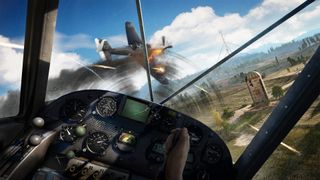
Then the gameplay trailer starts. The gameplay trailer starts and I’m greeted with goofy, knockabout, Far Cry silliness as standard, and frankly, one of the most jarring tonal juxtapositions I’ve seen in a long time. Chainguns strapped to cropdusters. Pitchforks thrown merrily in generic-looking rednecks’ faces. NPC booze vendors with homemade armouries stashed behind the bar, and cool, Good Boy helper-dogs who’ll dutifully run up and collect guns from dead bodies for you. Far Cry 5 doesn’t look terribly sober at all. It looks like a staggering, hollering drunk of a Far Cry, in fact. A really fun one, don’t get me wrong. One I really want to party with. But I’m left confounded as to the point of any of the big, heavy, well-thought-out, serious stuff mentioned earlier.
Are Ubisoft caught between a desire to be bold and the crushing economics of AAA game development?
Is Far Cry 5's premise pure opportunism? A simple surface allusion to the world’s biggest controversies in order to build a hot-potato narrative around the latest entry in a series whose level of hype has – let’s face it - been cooling off slightly for its last two sequels? I really hope not. That would be a tad distasteful, and potentially dangerous too, and would rather fly in the face of the nuanced, open discussion Hay frames the presentation with. So perhaps we’re just looking at a standard-issue disconnect between narrative and gameplay. Not every game manages to have its action make sense in terms of its story, after all, and it’s particularly tricky to change tone when you have the baggage of several games’ worth of well-liked systems to deal with. Just look at Grand Theft Auto 4’s messy combination of aspiring redemption tale and endless, unquestioning spree-killing.
Listening to Hay’s later conversation with fellow GR+ writer Lucas, I’m still hopeful that Far Cry 5 will stare headlong into the face of its antagonists, but I’m not entirely sure it will ask too many of the big questions while doing so. Hay describes a game that will open by establishing the nature of its overarching threat, and the powerful, charismatic figures in play, before setting the player loose to explore and interact with its world in any way they want. He describes a great care for authenticity of location and characterisation, but also states that Far Cry 5 is ultimately entertainment, and will twist things to its own ends. And I can't help noticing how often Ubisoft's official press materials use the word "cult" instead of "militia".
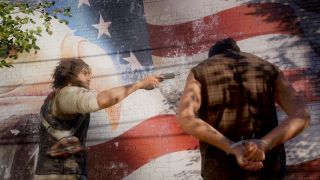
And perhaps most tellingly, when asked about the hulking thematic elephant of race (racism certainly isn't inherent to these groups, but there is a pro-Christian tendency, and sometimes notable sympathy from neo-Nazi movements), and how it will play into Far Cry 5’s narrative drive, he explains that this time - for the first time - Far Cry will provide character creation tools, allowing the player to customise several variables, including skin-tone.
While an increased sense of character ownership is always welcome in games that encourage the player to play their own way, I can’t help pondering that by putting the protagonist’s ethnic identity in the hands of the player, Ubisoft might be taking the soft option, letting the player engage or side-step such matters by their own choice, and thereby allowing itself the same side-step. Certainly, if the lead character’s background is malleable, that seems to preclude the possibility of a strongly focused narrative with specific perspective, leaving such explorations solely within the player’s individual interpretive canon.
Compare the budget, scale, and team size of a Far Cry game to something like Jordan Peele’s brilliant, racially and politically driven horror-cum-thriller-cum-satire Get Out
Of course it’s still, on the whole, harder for AAA games to make such statements. Compare the budget, scale, and team size of a Far Cry game to something like Jordan Peele’s brilliant, racially and politically driven horror-cum-thriller-cum-satire Get Out. In relative terms, movies are cheaper to make and don't need to reach such a wide audience to break even, whereas games are often beholden to their costs, and might be less inclined to risk alienating a large section of the audience by making a bold statement.
A movie can be made quicker, leaner, and cheaper, and still feel like a polished, accomplished, complete prestige piece, where a big game has more difficult budgetary and sales concerns – as well as the issue of potential conceptual dilution by way of Ubisoft’s thunderous, international staff counts – before we even get near the possibility of nervy execs reluctant to rock the boat. But at the same time, ‘hard’ is not ‘impossible’, and perception is always the toughest part of any challenge. These things rapidly get easier when people start actually doing them. That’s how any medium progresses. Push a boundary, and it will eventually move. Hideo Kojima's Metal Gear Solid series has juxtaposed bold societal messages with slapstick comedy and OTT action for decades – juggling accessible gameplay, costs and market demands – even if his 'success' led (indirectly or otherwise) to the search for a new employer.
Will Far Cry 5 be a good game in its own right? So far it looks like it has every chance of being. But I can’t help hoping it’s more than that. It has no obligation to be, of course, but there’s the potential to create something beyond a fun, sandbox shooter here. With its choice of subject matter, Ubisoft has opened the door to potentially richer, more thoughtful territory – territory with a path already paved by one or two other recent, big-name games. For now, I’m just going to have to cross my fingers that it has the courage to walk that path all the way to the end.
Most Popular






